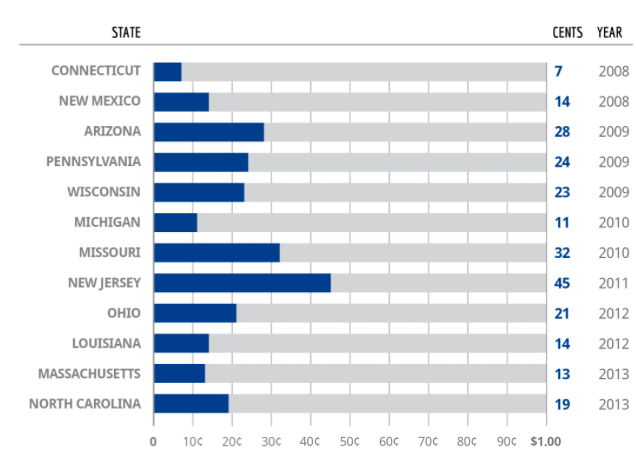A new report shows taxpayer funded film incentives continue to perform poorly nationwide.
The report, Calling Cut on Film Incentives, was recently released by the Beacon Center of Tennessee and focuses on the poor investment for taxpayers in the Volunteer State. While there has never been an official ROI calculation from the state of Tennessee, the report looked at three key points:
Mississippi has a similar experience with film incentives. A 2015 PEER report shows taxpayers receive just 49 cents for every dollar invested in the incentives. For those looking at a bright side, we are actually “doing better” than many other states.
This includes our neighbors in Louisiana, who recover only 14 cents on the dollar. They also have one of the most generous programs in the country; it was unlimited until lawmakers capped it a couple years ago. (Other reports show the Pelican State recovering 23 cents on the dollar, either way a terrible investment.)
Beyond Mississippi, Tennessee, and Louisiana, film incentives are universally a poor investment throughout the country. Numerous studies have been conducted on film incentives. All sobering for those worried about taxpayers. Here is a review of the return per tax dollar given, from 2008 through 2013. In these third-party studies, covering 12 different states, there was not a program that returned 50 cents on the dollar (never mind actually made money).

Source: John Locke Foundation
Since this chart was published, studies on similar programs in Florida, Virginia, and West Virginia have shown similar results. No program had a positive ROI.
If an individual was investing their own money, they would never make any of these deals. But is has been said, and proven, many times that no one spends their own money more carefully than that person.
Mississippi lawmakers have begun to scale back on the “handouts to Hollywood.” Last year, lawmakers chose not to extend the non-resident payroll portion of the incentives program. This previously allowed for a rebate on payroll paid to cast and crew members who are not Mississippi residents.
But we still have two incentives on the books. One is the Mississippi Investment Rebate, which offers a 25 percent rebate on purchases from state vendors and companies. The other is the Resident Payroll Rebate, which offers a 30 percent cash rebate on payroll paid to resident cast and crew members.
And old habits die hard. The House voted to bring back the incentives this past session. The bill didn't make it through the Senate and that incentive is still dead.
Mississippi is moving in the right direction and they are joined by other states. While all but six states had film incentives a decade ago, the number is now up to 19. Mississippi can be number 20 by removing the incentives currently on the books.
One of the common prescribed reasons for why need film incentives is because it’s “good” for the state to have movies filmed here. As is often the case in government, we focus on the inputs. How many films are made here? What movie star was in Mississippi? That is nice, but the focus should be on outcomes.
The other common argument is that other states are doing it. That is the point the Beacon Center made about producers holding the state hostage and threatening to move. Producers in Mississippi have raised the same point. And I am sure they have in every other state where film incentives are threatened.
However, simply because another state is wasting money does not mean Mississippi should join them.
Corporate welfare is never a good idea. It’s an even worse idea when you know we are losing money and you want to continue with or resurrect such a program. Our goal should be to have the most competitive business climate in the country. The tax breaks that a few chosen industries or companies receive should be made available to all. When we do that we will remove the need for taxpayer funded incentives.